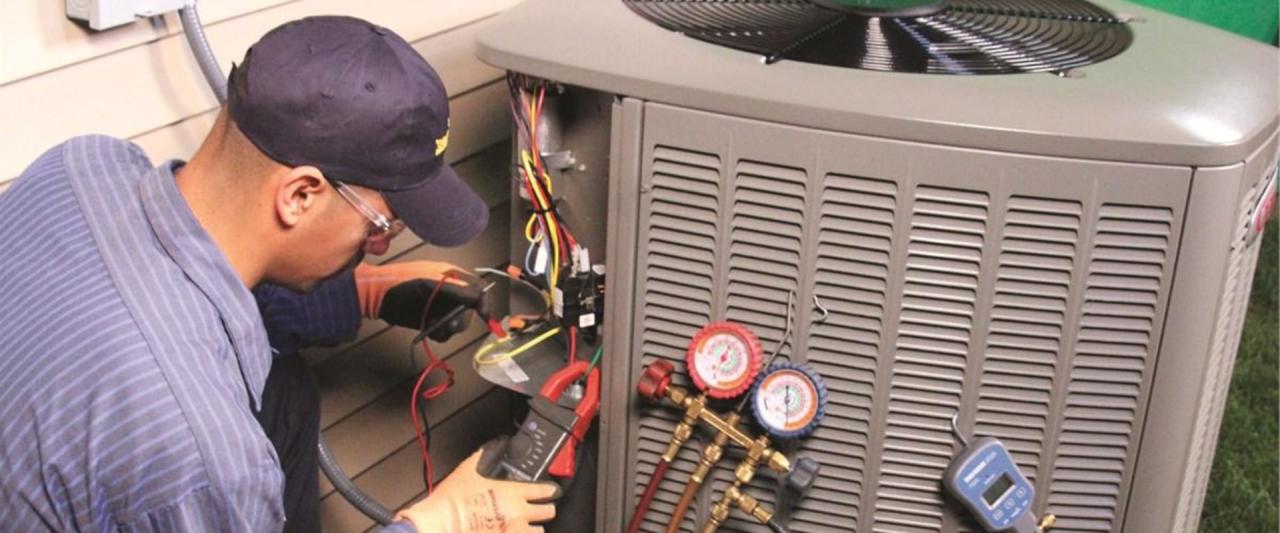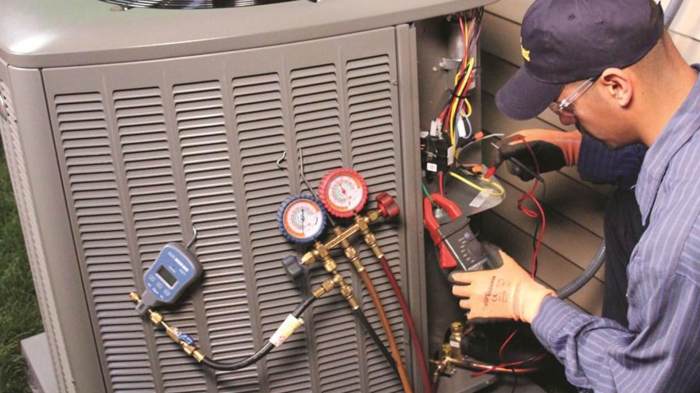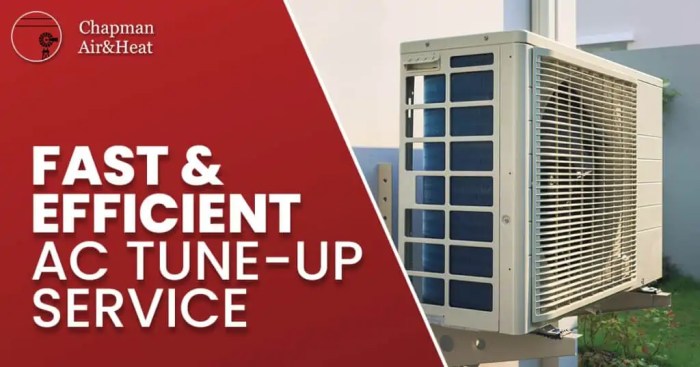Optimizing Your AC: The Importance of Regular AC Tune Up
Embark on a journey towards a more efficient air conditioning system with regular AC tune-ups. Discover the key components of a comprehensive tune-up checklist and the frequency at which it should be conducted to ensure your AC unit functions at its best.
Uncover the benefits of staying proactive with your AC maintenance to avoid costly repairs and keep your indoor environment comfortable all year round.
Overview of AC Tune Up

Regular AC tune-ups are essential for maintaining optimal performance and extending the lifespan of your air conditioning system. By scheduling routine tune-ups, you can ensure that your AC unit is running efficiently, effectively cooling your home, and avoiding costly repairs in the future.
Components of an AC Tune-Up Checklist
- Inspecting and cleaning the air filters
- Checking and adjusting the thermostat
- Examining the condenser coils for dirt and debris
- Testing the refrigerant levels
- Tightening electrical connections
- Lubricating moving parts
- Checking overall system performance
Frequency of AC Tune-Ups
AC tune-ups should ideally be performed at least once a year, preferably before the start of the cooling season. However, older or heavily used systems may benefit from more frequent maintenance checks to ensure peak performance.
Benefits of Regular AC Tune-Ups
- Improved energy efficiency, reducing utility costs
- Enhanced cooling performance, maintaining comfort in your home
- Prevention of breakdowns and costly repairs
- Prolonged lifespan of the air conditioning system
- Better indoor air quality
Common AC Issues Addressed in a Tune-Up
During an AC tune-up, several common issues are typically addressed to ensure the system is running efficiently and effectively.
1. Refrigerant Levels
One of the main issues checked during a tune-up is the refrigerant levels in the AC unit. Low refrigerant levels can lead to poor cooling performance and increased energy consumption.
2. Air Filters
Dirty or clogged air filters can restrict airflow, causing the AC system to work harder to cool the space. Regular filter replacement during a tune-up can improve efficiency and indoor air quality.
3. Thermostat Calibration
Incorrect thermostat calibration can lead to temperature inconsistencies and inefficient cooling. Calibrating the thermostat during a tune-up ensures accurate temperature control.
4. Condenser and Evaporator Coils
Dirty coils can reduce the AC system's ability to transfer heat effectively, resulting in reduced cooling performance. Cleaning and inspecting the coils during a tune-up can improve efficiency.
5. Electrical Components
Checking and tightening electrical connections, as well as inspecting components like capacitors and contactors, can prevent system failures and ensure smooth operation of the AC unit.
Warning Signs for an AC Tune-Up:
- Weak Airflow
- Inconsistent Cooling
- Unusual Noises
- Frequent Cycling
- Increased Energy Bills
Steps Involved in an AC Tune-Up
During an AC tune-up, technicians follow a systematic process to ensure the proper functioning and efficiency of the air conditioning system. This involves a series of inspections, cleaning tasks, and maintenance procedures to address any potential issues and optimize performance.
Inspection Procedures
- Check thermostat settings to ensure optimal temperature control.
- Inspect electrical connections and components for any signs of damage or wear.
- Examine the condensate drain to prevent clogs and water leakage.
- Evaluate the refrigerant levels and assess for any leaks that may impact cooling efficiency.
Cleaning and Maintenance Tasks
- Clean or replace air filters to improve air quality and airflow.
- Clean the evaporator and condenser coils to enhance cooling performance.
- Lubricate moving parts to reduce friction and wear on the system.
- Inspect and adjust blower components for proper airflow and efficiency.
DIY AC Maintenance Tips
Maintaining your AC unit between professional tune-ups is crucial to ensure its efficiency and longevity. Here are some DIY maintenance tips that homeowners can follow:
Clean or Replace Air Filters Regularly
One of the simplest yet most important tasks is to clean or replace your AC filters regularly. Clogged filters restrict airflow, making your AC work harder and less efficiently.
Keep the Outdoor Unit Clean
Make sure the outdoor unit of your AC is free from debris such as leaves, dirt, or branches. Regularly clean the area around the unit to ensure proper airflow.
Check and Seal Air Leaks
Inspect your windows, doors, and ductwork for any air leaks. Sealing these leaks will prevent cool air from escaping and reduce the strain on your AC unit.
Monitor Thermostat Settings
Optimize your thermostat settings based on your schedule and preferences. Lowering the temperature unnecessarily can increase energy consumption and wear out your AC unit faster.
Schedule Regular Maintenance
While DIY maintenance is important, it's also crucial to schedule regular professional tune-ups for your AC unit. A professional technician can identify and address issues that may not be apparent during DIY checks.
Cost Considerations for AC Tune-Ups

Investing in regular AC tune-ups can actually save you money in the long run compared to emergency repairs. Let's take a closer look at the cost considerations for AC tune-ups.
Comparison of Costs
- Regular AC tune-ups are typically more affordable than emergency repairs, which can be quite costly due to the urgency and extent of the issue.
- By scheduling routine tune-ups, you can catch small problems early on before they escalate into major issues that require expensive repairs.
- Emergency repairs often involve additional costs such as after-hours service fees, which can significantly increase the overall expense.
Long-Term Cost Savings
- Regular AC tune-ups help improve the efficiency of your system, leading to lower energy bills over time.
- Well-maintained AC units are less likely to break down, reducing the need for costly repairs or replacements.
- Proper maintenance can extend the lifespan of your AC unit, allowing you to postpone the expense of purchasing a new system.
Finding Affordable Services
- Research local HVAC companies and compare their prices for AC tune-up services.
- Look for promotions, discounts, or service packages that could help lower the cost of a tune-up.
- Consider signing up for a maintenance plan that includes regular tune-ups at a discounted rate.
End of Discussion

As we wrap up our exploration of AC tune-ups, remember that investing in regular maintenance not only enhances your AC's performance but also extends its lifespan. By addressing common issues, following proper maintenance steps, and knowing when to seek professional help, you can enjoy a cool and efficient home environment without breaking the bank.
Questions and Answers
How often should I schedule an AC tune-up?
It is recommended to schedule an AC tune-up at least once a year to ensure optimal performance.
What are some warning signs that indicate the need for an AC tune-up?
Signs such as reduced airflow, strange noises, or uneven cooling can indicate the need for a tune-up.
Can I perform basic AC maintenance tasks on my own?
While some tasks like changing filters can be done by homeowners, it's best to leave complex issues to professionals to avoid damage.




